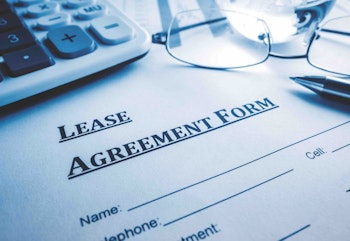Retailers facing lease renewals should adjust their negotiating tactics to reflect the realities of their local markets. In some areas of the country an increase in available space is exerting downward pressure on prices. In others, landlords remain aggressive as a healthy economy encourages more leasing inquiries. Retailers must research their local markets for current pricing and create fallback positions that provide negotiating leverage.
It’s time for your lease renewal — are you ready to negotiate? If you’re like many retailers your answer is “No.” But a lack of preparation can be costly. Rent is typically a retailer’s second largest operating expense after labor. And the common industry practice of adjusting staff levels to reflect a changing business environment simply won’t work with lease payments: You’re pretty much stuck with them once you’ve signed on the bottom line.
So, how can you get a better deal? Start by understanding the changes underway in the leasing environment.
“The market for retail space has changed significantly in recent years,” said William D. Himmelstein, CEO of Chicago-based Tenant Advisory Group, a real estate tenant brokerage firm (www.tenantadgrp.com). “In many areas of the country more space has become available, and that means retailers are in a much stronger negotiating position. Not only are growing vacancy rates putting downward pressure on prices, but incentives — such as free rent and improvement dollars — are more common.”
What’s behind the growth in available space? A major factor, says Himmelstein, is the accelerating trend by consumers to order online and enjoy cheap or free delivery. That has caused many retailers, including some large chains, to reduce their brick and mortar square footage and scale back expansion plans.
In other areas of the country, though, the story is different.
“Property prices have escalated so quickly in some cities that landlords are holding mortgages for values far less than the current worth of their properties,” said Dale Willerton, a Los Angeles-based tenant lease consultant and author of Negotiating Commercial Leases and Renewals for Dummies (www.TheLeaseCoach.com). “As a result, these landlords can carry empty property for a period of time while they hold out for a tenant who will pay top rates.”
There’s another reason for the upward pricing pressure in those markets, added Willerton.
“Recently the healthy economy and stock market has sparked an increase in the number of people who want to start businesses,” he said. “That translates into a greater number of leasing inquiries, and that encourages landlords to hold out for a high rate.”
States where landlords are aggressive despite high vacancy rates include California, New York, New Jersey, Virginia and Florida.
Start Early
When should you start planning your own strategy for landing a better deal? Early, according to the experts. “Time is your friend in real estate,” said Himmelstein. “The earlier you can start thinking about renewal, the more advantage you will have over the landlord. Relocating a retail store takes a lot of time, so if you delay until 3 or 4 months before lease expiration, the landlord will have the upper hand.”
Start too early, on the other hand, and you may find yourself locked into your current spot when a better location becomes available. So what’s a good compromise? “The short answer is 1 year in advance of the lease expiration,” said Willerton. “But there is a caveat: If you have a renewal option clause, you want to be sure to start at least 6 months before that.” The option might not be your best choice (as we will see below) but you still want it as a backup. “The renewal option clause is your fail safe, your insurance.”
Before you do anything else, double-check your lease’s expiration date. Get that wrong and your chances of a successful negotiation plunge. And it’s easy to make a mistake when the passage of time impairs memory. “The day you opened your store is not necessarily the day your lease expires,” cautioned Willerton.
Improve Terms
If your lease is like most others, it calls for a 5-year term and one or more 5-year renewal options. But the renewal option, while designed to offer some protection to the retailer, is not necessarily your best choice. “One of biggest myths is that the only way to renew your lease is to exercise your renewal option clause,” said Willerton. “That’s not the case, and in fact if you do so, you suffer a significant downside: Everything but the rent amount will be off the negotiating table. That’s a lousy negotiating position to be in.”
No wonder, then that in 98 percent of the lease renewals negotiated by Willerton, the renewal option is not exercised. “Bear in mind that most of the time the landlord wants you to stay. That gives you some negotiating leverage. You lose that, though, if you exercise your renewal option.”
We’ll get to what can be negotiated later in this article.

Create “Plan B”
Once you have determined your lease renewal date, put yourself in a better negotiating position by locating alternative store locations you can move to if your landlord’s terms are not to your liking.
“The most common mistake is to only negotiate with the existing landlord on the current location,” said Willerton. “Doing so fails to give the landlord a reason to give you a good deal.”
The problem worsens if you tip your hand by letting the landlord know you are not shopping around. “Suppose your landlord asks, ‘Are you looking at other properties?’” posed Willerton. “You might respond, ‘Oh we don’t want to move — we are not talking with any other landlords.’ Right there your landlord has you.”
It’s far better to line up some alternative locations where you can move if your landlord becomes unreasonable. “You need to create some competition for the landlord,” said Willerton. “Ask yourself: Where would I go if I have to move? Do I have relocation options if this landlord will play hardball and double my rent?”
Having alternative locations in your pocket will give you the freedom to reject onerous terms. “Tenants only get the best deal when they are walking away from the negotiating table — not when they are at it,” said Willerton. “Remember that landlords always hold something back that they will give up only if it’s clear the retailer might move.”
Indeed, having the landlord chase you as you are walking away from a deal is the best position to be in. “The tenant is the landlord’s customer, and the customer deserves to be pursued,” said Willerton. “That is the mindset too many tenants do not understand.”
One more thing: “Retailers who do not need to be located in high-traffic retail locations for walk-in traffic have more negotiating power,” said Willerton. “They can consider moving to more remote locations with lower rent.”
Talk It Up
What’s the going rate for retail space in your town? Maybe it has changed since you last went shopping. You want to find out early in the negotiating process. Do your due diligence. Investigate your local market and find out what other retailers are paying in your area.
That means talking not only with real estate agents but also other retailers — especially those with property from the same landlord. They can tell you a lot more than just what they are paying. “Some of your fellow tenants will have recently gone through the renewal process,” said Willerton. “They can give you some valuable insights into how your landlord negotiates.”
And more: Your neighboring retailers can alert you to relocation plans of their own. That can be a major factor when it comes to the desirability of your current location. “If you assume everyone else will be there after you renew, you might be wrong,” said Willerton. “You can lose four neighbors and get four new ones in a 5-year cycle. Knowing someone is moving can make a difference in terms of your decision to stay or move.”
You may also find out some surprising things. Maybe the landlord is planning to reconfigure the space surrounding your store, or maybe an adjacent tenant with more bucks wants to expand — in your direction. “You want to find out such things in advance,” said Willerton.
You Go First
Successful retailers take the initiative when it comes to lease renewal negotiations. “Most tenants think the landlord is going to come to them and remind them in a timely manner that their lease is expiring,” said Willerton. “But most landlords will not do that. That’s because they want the clock to tick right down to where they have you over a barrel.” Suppose only 4 weeks remain before expiration, says Willerton. What can you do if the renewal terms are onerous? There’s no time to move or negotiate. “Be proactive. Don’t lose your time advantage.”
Speaking up early is great, but don’t tip your hand. “Too many times tenants say the wrong thing,” said Willerton. “Suppose you see the property manager in the parking lot, and you casually say, ‘By the way, our lease will be expiring and we want to do some major renovations and look forward to 5 more years.’ You have just given the property manager a ‘buy signal.’ You have said you intend to stay. So why would the landlord do anything but try to raise your rent?”
And on that topic of renovations: Avoid doing them too close to renewal time. “If you do a $100,000 renovation a year before your lease is up, you have just given a ‘buy signal’ that puts you in a bad negotiating position,” said Willerton. “Time your renovations to be concurrent with, or just after, renewal time.”
Terms and Increases
While 5 years is the norm for retail renewals in many areas, consider negotiating a longer term — say 10 years — if that’s more to your liking. One benefit is that banks will only lend money for the length of your lease, and you may prefer a longer term loan. You may be able to swing more years if you have been a good tenant, because long term leases benefit landlords, too.
Long-term leases are particularly valuable for landlords because they help improve the value of a commercial property. Conversely, you can negotiate a shorter term lease if that’s better for your business plan. “I see the average lease being from 3 to 5 years,” said Craig Melby, founder of LeaseSmart, a nationwide tenant brokerage based in Stuart, Florida (www.themelbygroup.com). “Often you can get a better deal, say a better rate or more generous amenities, by doing a longer lease. Just bear in mind, though, that the broker gets paid a commission per year, so make sure you are not getting pushed into a long-term lease for the wrong reasons.”
And how about the rent increase percentage? Anything you can do about that? “Most leases call for an increase of 3 percent per annum,” said Willerton. It’s important to negotiate for lower increases if you possibly can. “The big problem is that 3 percent compounded over 10 years is more like a 50 percent increase — not 30 percent.” And that can be onerous. “There is a limit to how much retailers can raise prices — and it is generally not 3 percent per year. So the landlord is asking for something that the tenant cannot keep up with.”
You may be able to get a lower increase, says Willerton. “Some landlords are more open to lesser increases, saying that they just want to match inflation, which is seldom over 3 percent.”
You should also try to negotiate terms that go beyond pricing. Remember: Any inducement that can be negotiated on a new lease can be negotiated on a renewal. Maybe you can get some site improvements such as better lighting, a new paint job, or more attractive signage. And how about some free rent, or a refund of your security deposit? Or some “tenant allowance” — money from the landlord to help build out your space? Or how about eliminating the personal guaranty? How about removing some clauses that you found unpalatable? Renewal time is the right time to put these and similar items in play.
Get It in Writing
Avoid relying on oral promises when negotiating your lease renewal. They can evaporate like clouds on a summer day.
Consider this scenario: “Eight months before your lease expires you have a conversation with your property manager,” said Willerton. “The manager says something like this: ‘We will have to raise your rent by about 5 percent. But don’t worry about it — we will get to it in a few months.’ Later, 2 months before your lease expires, you get hit with a 50 percent increase. What does the property manager say? ‘Yeah, I was surprised, too.’”
Here’s a similar scenario from Willerton: “Suppose that 8 months before your lease is up, the property manager sends you a renewal proposal with some attractive terms. You say ‘That’s not so bad; I’ll sign it.’ A few months later, you get the actual lease from the landlord, with far more onerous terms. What does the property manager say? ‘I didn’t know they were going to do that to you.’”
Both scenarios can happen even if you have a great relationship with the property manager, warns Willerton: “Landlords often give leasing people and property managers ‘plausible deniability’ by not telling them of future plans. Remember that nothing counts until it is in writing and signed by the landlord.”
Get Help
As the comments in this article suggest, negotiating a favorable lease renewal is far more complicated than just signing off on a renewal option. It will often pay to have some outside assistance. “It’s often a good idea to use a tenant broker,” said Melby. “They cost nothing to use because their payment comes from the landlord.” At the very least, says Melby, brokers can help get you a fair price by referencing comps and figuring out what you should be paying.
One caution, “If you are looking for a small space of, say, 1,200 square feet, the commission will not be high enough to interest a broker,” said Melby. “Consider hiring the tenant broker on a consulting basis to advise you.”
You might also want to consider the services of an attorney, who can be beneficial in other ways. “Brokers are there to minimize costs,” said Himmelstein. “Attorneys are there to minimize risk.” The broker will make sure your lease terms are competitive with those of other leases in your vicinity; the attorney will rewrite clauses that might put you at risk. Together with your own investigations of the local marketplace, these professional services can help you turn lease renewal time from a costly exigency into an opportunity to bolster your bottom line.








